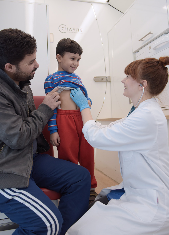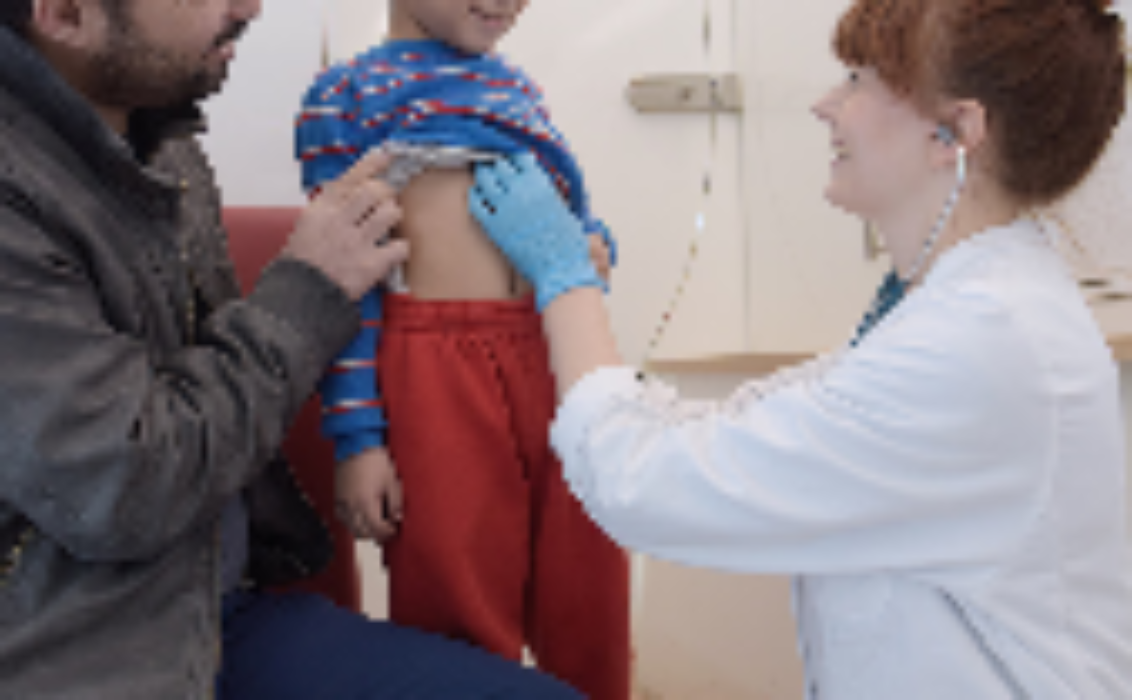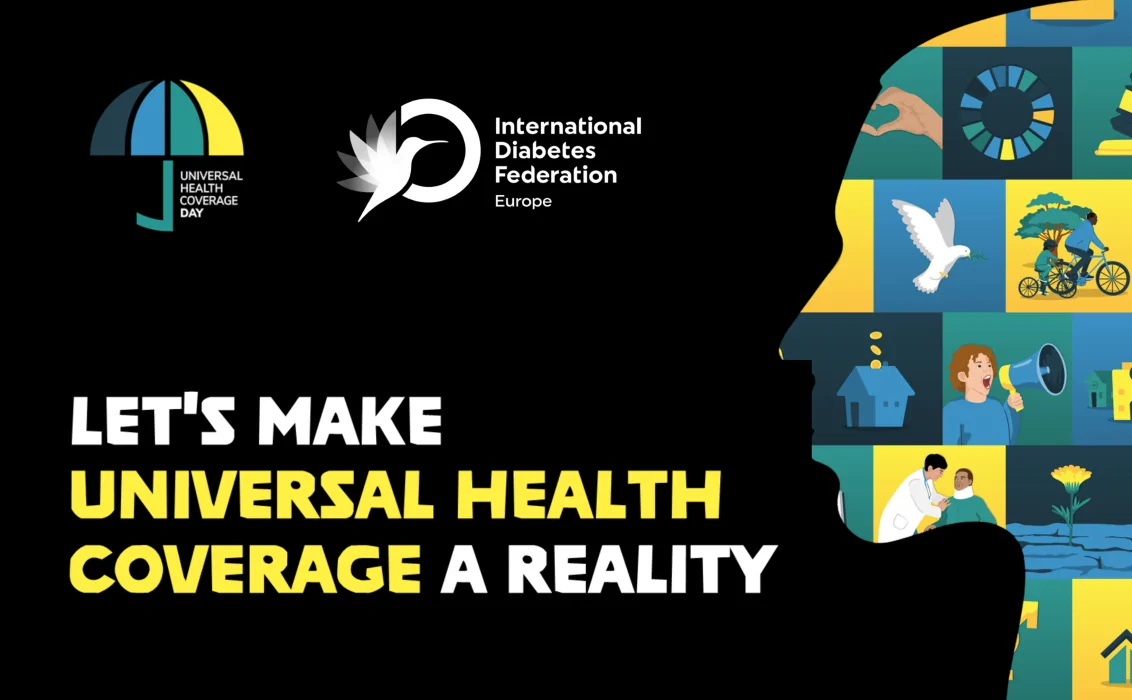“We can make a real difference that, for some, decides between survival and death.” An inspiring interview with Dr Katarina Braune
Whether it is forced movement of refugees or internally displaced people, millions of people move within Europe and into Europe every year. An unprecedented number of refugees and migrants arrived in European countries in recent years. Over 1.3 million arrived by the Mediterranean Sea since 2015; this is in addition to the almost 3 million Syrian refugees living in Türkiye1. These human beings leaving their home, country, family and friends to find a safer or more prosperous place to live are the most vulnerable in our society, and they need to be protected. They move under conditions that are psychologically, socially and physically difficult, and face the reality of re-settlement in surroundings that may seem – or be – unwelcoming.
No matter where people come from, or where they go, they take any inherited pre-disposing disease factors and existing conditions with them, which need to be looked after wherever they are. Furthermore, the stress of migration and adapting to a new place, often with little support, can lead to the development of type 2 diabetes2.
IDF Europe takes the matter of migrant populations at heart. With participatory status to the Council of Europe – the European leading human rights organisation- IDF Europe has an open dialogue on the issue of health, especially chronic diseases such as diabetes, in refugees and migrants with the Council of Europe’s Committee on Social Affairs, Health and Sustainable Development, as well as the Migration and Equality Department.
 On World Refugee Day, we spoke to a truly inspiring person, Dr Katarina Braune. Katarina was diagnosed with type 1 diabetes at the age of 12. She is a Medical Doctor and researcher in the Department of Paediatric Endocrinology and Diabetes of Charité Universitätsmedizin in Berlin, Germany. She is also a former IDF Young Leader in Diabetes, a volunteer in refugee health care and has recently given a TEDx talk about the “challenges of refugees living with chronic conditions living under a humanitarian crisis”.
On World Refugee Day, we spoke to a truly inspiring person, Dr Katarina Braune. Katarina was diagnosed with type 1 diabetes at the age of 12. She is a Medical Doctor and researcher in the Department of Paediatric Endocrinology and Diabetes of Charité Universitätsmedizin in Berlin, Germany. She is also a former IDF Young Leader in Diabetes, a volunteer in refugee health care and has recently given a TEDx talk about the “challenges of refugees living with chronic conditions living under a humanitarian crisis”.
The prevalence of diabetes is high in most countries of origin of refugees. Do you have a lot of people with diabetes in your consultation as volunteer?
You are right, according to prevalence statistics, there should be a much higher number of refugees with diabetes than the ones actually arriving in a European country. Unfortunately, most of them don’t and only a small number successfully manage the dangerous journey and the risks of diabetes at the same time. As a refugee with a chronic condition, especially for vulnerable groups like children, anything could go wrong at any time. In war, bombs and guns are not the only deadly threats – missing infrastructure and lack of medical support can also be their death sentence. During their journey, finding access to insulin and diabetes supplies is difficult. Our patients mostly report they were only able to find it on the black market and of poor quality. They had to ration their test strips, food and insulin in order to survive the next days. Poor hygienic conditions and the psychological burden of an uncertain future made it even harder to achieve diabetes control. Therefore, their health situation on arrival is oftentimes critical and needs us as medical professionals to act fast. Many refugees with diabetes arrive in poor glycaemic control after they ran out of supplies – sometimes they have not been able to test their blood glucose or have not taken their full dose of insulin (or oral diabetes medication) in days, and have not seen a specialist team in months or even years.
As a diabetes activist and volunteer in health care, it was a heart-breaking moment to realize that I probably wanted to support diabetes patients in the wrong place. I sadly came to the conclusion that, even with over one million Syrian refugees who have arrived in Germany, the majority of those with chronic diseases gets stuck at closed borders or in refugee camps in neighbouring or transition countries. Only some reach a country that can provide them a new home and access to local health care services, vitally important medication and specialist treatment.
This is dramatic indeed. How are those refugees with diabetes who manage to reach Germany screened and taken care of by the health system when they arrive? What are the main issues they face?
A medical interview and examination is a mandatory part of the registration process for asylum seekers in Germany. The main purpose of this quick check-up is to prevent infectious diseases and parasites from spreading around in the camps. Everyone is screened for signs of infection, tuberculosis, scabies and lice. Unfortunately there is no nationwide or international standard interview or screening protocol for pre-existing conditions at this point. In Berlin we were able to improve the situation significantly and recommend to other teams to implement similar structures. In our refugee health unit, every asylum seeker gets the chance to talk to a team of a medical doctor, nurse and interpreter as a part of their registration process. They are interviewed about their previously diagnosed conditions and acute complaints. Our team then provides emergency treatment and connects them to a specialty doctor for future care. We also offer psychological support for those who suffer from trauma and depression. Together with Berlin’s asylum office, we have now established structures to ensure they get access to the public health care sector in Germany. Every registered person is now immediately covered by health insurance that provides necessary treatment for most acute and chronic conditions as well as drugs and medical supplies for free or a reasonable price. However, even if the structures have improved by now, settling down in a new country is still an on-going challenge: the language barrier to professional workers, differences in culture and understanding administrative processes can make solving problems quite difficult.
Fortunately, Berlin is one of the big global melting pots and a multicultural habitat for many people. Nearly every third person living in Berlin today has a migrant background. This includes Arabic, Kurdish and Farsi speaking General Practitioners and specialist doctors who work and live in Berlin. However, they are usually fully booked and the health care system adapts very slowly to the needs of our changing population. In other places in Europe, especially in rural areas, the medical network is much less dense than in Berlin. In those areas the language barrier can be a major hurdle. Our refugee health unit solved this issue with the implementation of an online video interpreter system. This also serves patients who speak languages like Tigrinya or Somali for which interpreters are hard to find.
It is also important to note that the German Diabetes Association has a working group on “Diabetes and Migration”. They have published an informative flyer3 about prevention of type 2 diabetes for employees of aid organisations and German authorities dealing with refugees on how to address specific questions, e.g. adequate nutrition and lifestyle choices, how to address cultural barriers among others.
This is really impressive and inspiring work! Strongly linked to diabetes is the issue of nutrition that you evoked. Do you have a strategy in place to ensure access to healthy food?
You are perfectly right. Malnutrition is a common problem in refugees, especially in children. Many of them are too small for their age, underweight and show signs of various deficiency syndromes. Even in the refugee camps in Europe, proper nutrition is an on-going problem for them. Catering is provided by hosting institutions and usually not monitored by any authority, medical professionals or dieticians. Funds for refugee camps are limited, therefore the menu is oftentimes put together as “the cheaper, the better”. Our patients often report about careless selection of food with poor nutritional variety. Having worked and eaten with them in their refugee homes for a year, I can unfortunately confirm this for most (but luckily not all) providers. To fight malnutrition in the most vulnerable groups, we gave for free baby food and nutritional supplements for children and pregnant women in our refugee clinic. By now, the situation has improved for those refugee families who have moved from mass accommodation (e.g. gyms and airport hangars) to shared accommodations or individual apartments where they can cook and have meals together.
Based on your experience, how can we, as a society, help refugees with diabetes? What should be done at the national and European level to support them better? What should be the role of our national member associations?
The refugee crisis in and around Syria is a global responsibility. However, taking responsibilities starts with each one of us – at our front door, at our work place, at our home, when we talk to our friends and families, where we travel.
It is crucial to build and strengthen cooperation between our Member Associations and organisations reaching beyond our national borders to help, such as Doctors Without Borders/Médecins Sans Frontières (MSF), the Syrian American Medical Society (SAMS), the IDF Life For a Child programme, Insulin For Life, type 1 international to name but a few. For example, the document from the German Diabetes Association is a great tool to ensure that refugees with type 2 diabetes are taken care of by non-diabetes related organisations.
For those who arrive in our countries and live in refugee camps in your neighbourhoods, we can all contribute by providing our personal and professional skills to directly help those in need, to create awareness – and even just by taking a moment and think before we put our voting ballots in a box and decide on who will make the big decisions for us as a society in the future. Small changes can make a big difference in the end. If we take action together, we can make a real difference that, for some, decides between survival and death.
Dr Katarina Braune will present her work on 7 December 2017 at the World Diabetes Congress in Abu Dhabi during the session “Diabetes and disasters: real world testimonies”.
1http://www.euro.who.int/en/media-centre/events/events/2017/07/summer-school-on-refugee-and-migrant-health
2 Richard S Surwit et al, “Stress and diabetes Mellitus” Diabetes Care 1992 Oct; 15(10): 1413-142.
3http://migration.deutsche-diabetes gesellschaft.de/fileadmin/Redakteur/Ueber_uns/Arbeitsgemeinschaften/AG_Diabetes_und_Migranten/Microsite_AG-Diabetes_Migranten/Infoblatt-01-2016-AG_Diabetes_und_Migranten.pdf



